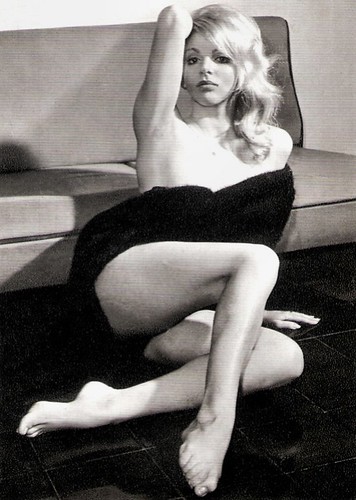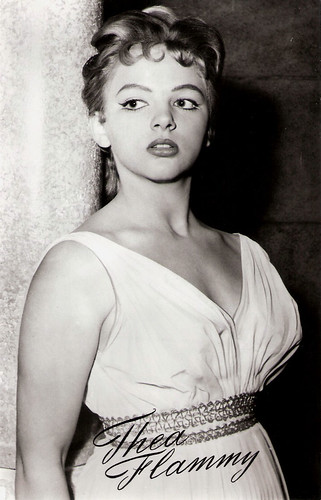At the Unofficial Netherlands Film Star Postcards Festival (NFSPF), we present today a post on blonde starlet Thea Fleming (1942). She started as the 'Dutch Brigitte Bardot' and spent much of her career in Rome. There she appeared in several Italian B-films under the stage name Isabella Biancini. During the 1960s and early 1970s, she also starred in and directed several Fotoromanzi, the popular Italian photo novels.

Italian collectors card by La Rotografica Romana. Edito dalla Nat Nuova Alta Tensione.
Thea Fleming (also Flemming or Flammy) was born Thea Catharina Wilhelmina Gemma Pfennings in 1942 in Sittard in the south of the Netherlands. Her parents, Nou Pfennings and Mia Pfennings-Courage, were innkeepers. She has a brother, Jack.
In 1960 she was chosen as the Dutch BB (Brigitte Bardot). During a vacation with her mother in Italy, she reportedly was discovered by a film producer. Her first film appearance was a bit part in the drama La giornata balorda/A Crazy Day (Mauro Bolognini, 1960) with Jean Sorel. The script about the lower class of Rome was written by Pier Paolo Pasolini based on a novel by Alberto Moravia.
She stayed in Rome and worked as a double for Anita Ekberg in La dolce vita (Federico Fellini, 1960), according to local Dutch news reports. Another uncredited part followed in the comedy Letto a tre piazza/A bed for three (Steno, 1961) starring Totò and Peppino De Filippo. She had a small but credited role in the comedy Mariti a congress/Husbands in Congress (Luigi Filippo D'Amico, 1961) with Walter Chiari.
As Thea Flammy, she appeared in the musicarello Canzoni a tempo di twist/Songs with a twist beat (Stefano Canzio, 1962) with Little Tony. Her first bigger part was in the adventure film Taur, il re della forza bruta/Taur the Mighty (Antonio Leonviola, 1963), starring British wrestler Joe Robinson. Richard R. Chandeler at IMDb: “The story is about these bad people oppressing these innocent villagers and how Taur and his cowardly (but equally muscle-bound) companion go about liberating them. This movie is just horribly dull and mostly devoid of even unintentional humor.”
Credited as Isabella Biancini, she had a small part in the much better comedy Il successo/The Success (Mauro Morassi, Dino Risi (uncredited), 1963), starring Vittorio Gassman and Anouk Aimée. Excellent was also the comedy I mostri/15 From Rome (Dino Risi, 1963) with Vittorio Gassman and Ugo Tognazzi, but again her part was small.

Dutch postcard by Uitg. Takken, Utrecht, no. AX 4648.
Although local Dutch newspaper reports of the 1960s always called Thea Fleming a ‘film diva’, her actual film career in Italy was rather modest. As a starlet, she played small roles in quality films and bigger parts in exploitation films and she posed for countless glamour photos.
Fleming played supporting parts in little-known trash as the sexploitation film Salome '73 (Odoardo Fiory, 1965), the Eurospy film Asso di picche - Operazione controspionaggio/Operation Counterspy (Nick Nostro, 1965) and the comedy Mondo pazzo... gente matta!/Crazy world... crazy people! (Renato Polselli, 1966) starring Silvana Pampanini.
She had one of her biggest parts in the thriller Il nostro agente a Casablanca/The Killer Lacks a Name (Tulio Demicheli, 1966). Next, she had a part in the crime comedy L'assalto al centro nucleare/The Million Dollar Countdown (Mario Caiano, 1967) starring Frank Wolff, and in the war film Uccidete Rommel/Kill Rommel! (Alfonso Brescia, 1969) with Anton Diffring. Her last film at IMDb is the sex comedy Come fu che Masuccio Salernitano, fuggendo con le brache in mano, riuscì a conservarlo sano/How to Cuckold Jealous Husbands (Silvio Amadio, 1972).
She had a second career in the popular Fotoromanzi or Fotonovelas of the 1960s and 1970s. She appeared in such Italian and Spanish photo novels as O anjo da moret/The Angel of Death (1970) and Killing 5 La grande fuga. She worked not only as an actress/model but also as a director under the name of Claudia Courage.
According to Dutch newspaper reports she was engaged in the mid-1960s to film actor Giancarlo Viola (Giancarlo del Duca), the son of an aeroplane engineer. In 1973, she married the British singer-songwriter Michael Shepstone, known for writing hits like Yellow Boomerang by Middle of the Road. In 1974 their daughter Jessica was born. After that Thea Shepstone-Fleming lived with her family in Bournemouth, Great Britain.
Sources: Richard R. Chandeler (IMDb - now defunct), Delpher (Dutch), Nationaal Archief (Dutch), Italian Cinema Database, Killingmania (now defunct), Wikipedia and IMDb.
This post was last updated on 23 March 2024.

Italian collectors card by La Rotografica Romana. Edito dalla Nat Nuova Alta Tensione.
A double for Anita Ekberg
Thea Fleming (also Flemming or Flammy) was born Thea Catharina Wilhelmina Gemma Pfennings in 1942 in Sittard in the south of the Netherlands. Her parents, Nou Pfennings and Mia Pfennings-Courage, were innkeepers. She has a brother, Jack.
In 1960 she was chosen as the Dutch BB (Brigitte Bardot). During a vacation with her mother in Italy, she reportedly was discovered by a film producer. Her first film appearance was a bit part in the drama La giornata balorda/A Crazy Day (Mauro Bolognini, 1960) with Jean Sorel. The script about the lower class of Rome was written by Pier Paolo Pasolini based on a novel by Alberto Moravia.
She stayed in Rome and worked as a double for Anita Ekberg in La dolce vita (Federico Fellini, 1960), according to local Dutch news reports. Another uncredited part followed in the comedy Letto a tre piazza/A bed for three (Steno, 1961) starring Totò and Peppino De Filippo. She had a small but credited role in the comedy Mariti a congress/Husbands in Congress (Luigi Filippo D'Amico, 1961) with Walter Chiari.
As Thea Flammy, she appeared in the musicarello Canzoni a tempo di twist/Songs with a twist beat (Stefano Canzio, 1962) with Little Tony. Her first bigger part was in the adventure film Taur, il re della forza bruta/Taur the Mighty (Antonio Leonviola, 1963), starring British wrestler Joe Robinson. Richard R. Chandeler at IMDb: “The story is about these bad people oppressing these innocent villagers and how Taur and his cowardly (but equally muscle-bound) companion go about liberating them. This movie is just horribly dull and mostly devoid of even unintentional humor.”
Credited as Isabella Biancini, she had a small part in the much better comedy Il successo/The Success (Mauro Morassi, Dino Risi (uncredited), 1963), starring Vittorio Gassman and Anouk Aimée. Excellent was also the comedy I mostri/15 From Rome (Dino Risi, 1963) with Vittorio Gassman and Ugo Tognazzi, but again her part was small.

Dutch postcard by Uitg. Takken, Utrecht, no. AX 4648.
Director of fotoromanzi
Although local Dutch newspaper reports of the 1960s always called Thea Fleming a ‘film diva’, her actual film career in Italy was rather modest. As a starlet, she played small roles in quality films and bigger parts in exploitation films and she posed for countless glamour photos.
Fleming played supporting parts in little-known trash as the sexploitation film Salome '73 (Odoardo Fiory, 1965), the Eurospy film Asso di picche - Operazione controspionaggio/Operation Counterspy (Nick Nostro, 1965) and the comedy Mondo pazzo... gente matta!/Crazy world... crazy people! (Renato Polselli, 1966) starring Silvana Pampanini.
She had one of her biggest parts in the thriller Il nostro agente a Casablanca/The Killer Lacks a Name (Tulio Demicheli, 1966). Next, she had a part in the crime comedy L'assalto al centro nucleare/The Million Dollar Countdown (Mario Caiano, 1967) starring Frank Wolff, and in the war film Uccidete Rommel/Kill Rommel! (Alfonso Brescia, 1969) with Anton Diffring. Her last film at IMDb is the sex comedy Come fu che Masuccio Salernitano, fuggendo con le brache in mano, riuscì a conservarlo sano/How to Cuckold Jealous Husbands (Silvio Amadio, 1972).
She had a second career in the popular Fotoromanzi or Fotonovelas of the 1960s and 1970s. She appeared in such Italian and Spanish photo novels as O anjo da moret/The Angel of Death (1970) and Killing 5 La grande fuga. She worked not only as an actress/model but also as a director under the name of Claudia Courage.
According to Dutch newspaper reports she was engaged in the mid-1960s to film actor Giancarlo Viola (Giancarlo del Duca), the son of an aeroplane engineer. In 1973, she married the British singer-songwriter Michael Shepstone, known for writing hits like Yellow Boomerang by Middle of the Road. In 1974 their daughter Jessica was born. After that Thea Shepstone-Fleming lived with her family in Bournemouth, Great Britain.
Sources: Richard R. Chandeler (IMDb - now defunct), Delpher (Dutch), Nationaal Archief (Dutch), Italian Cinema Database, Killingmania (now defunct), Wikipedia and IMDb.
This post was last updated on 23 March 2024.
No comments:
Post a Comment